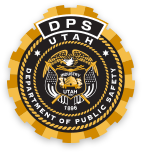Politics in the Patrol
In order to become a member of the Utah Highway Patrol during the 1930s and 1940s, an applicant had to be recommended and supported politically. Two examples of this political influence are as follows:
In 1938, Russell “Russ” H. Cederlund served as Chairman of Salt Lake City District 236 in the fifth ward of the Democratic Party. Russ decided to seek appointment as a member of the Utah Highway Patrol. Russ knew many politicians, therefore, he sought their assistance.
George Abbott was chairman of the State Highway Commission which oversaw appointments to the Utah Highway Patrol. Russ Cederlund was able to obtain letters of endorsement from Parnell Black, Chairman of the Salt Lake County Democratic Committee; State Senators, Warwick C. Lamoreaux, Lawrence E. Nelson, Will R. Holmes, Cornelia S. Lund, and Wendell Grover; President of the Senate, Herbert B. Maw; and Grant MacFarlane, Attorney at Law. Russ also obtained an endorsement from Gordon Weggeland, Treasurer of the Salt Lake County Democratic Committee. It is doubtful that any nomination to the Patrol received as many endorsements. Russ Cederlund was appointed to the rank of Patrolman, second class, on December 1, 1938.
Neldon S. “Dick” Evans applied for the Utah Highway Patrol in 1939 and had taken a written test at the University of Utah. He was never notified of his test results. Dick’s uncle was John Evans, Sheriff of Utah County. Sheriff Evans told Dick that if he wanted to be hired by the Utah Highway Patrol he must become involved politically. Sheriff Evans further stated that he thought the next Governor of Utah would be Herbert B. Maw. Dick became politically active and became a Precinct Chairman and campaigned for Maw. As was mentioned, Maw won the election in 1940 and was sworn in as Governor in January 1941. Dick was sworn in as a patrolman with the Utah Highway Patrol on January 27, 1941. Incidentally, Evans never did learn what his written score was on the 1939 test.
During Governor Maw’s administration, all members of the Utah Highway Patrol were required to give one percent of their paycheck to a political slush fund, designated for the reelection of the Governor. When J. Bracken Lee became governor in 1949, he was furious about this practice. Lee was a strong advocate of the Civil Service Bill, passed in 1945. It was at this time that most of the politics involved in hiring, promotions and firing, were removed from the Utah Highway Patrol. Governor Lee eliminated the political slush fund as a requirement for employment; however, Governor Lee also implemented a policy which stated that only one family member could work for state government. Trooper Russ Cederlund’s wife, Ardis, had worked for the Motor Vehicle Division for several years. Ardis was forced to seek employment in the private sector.
